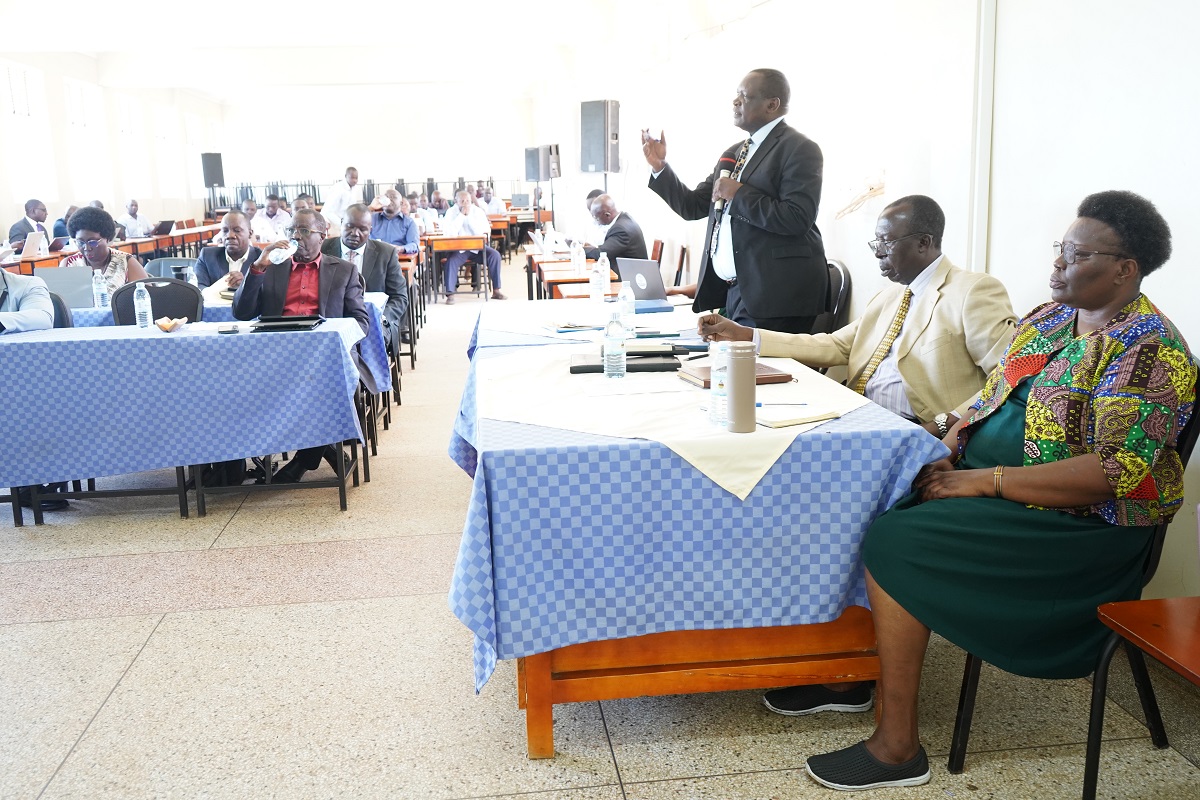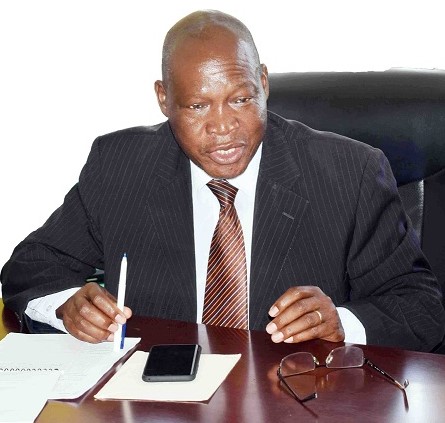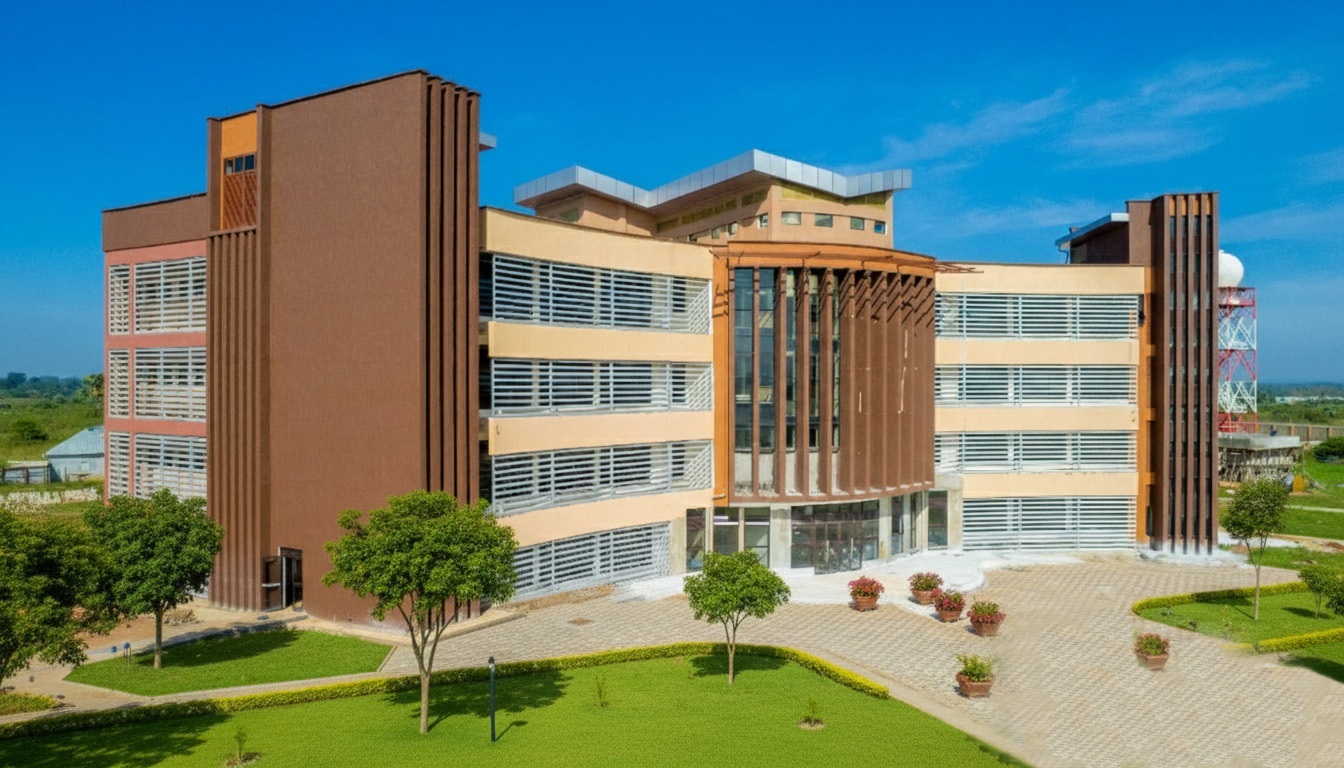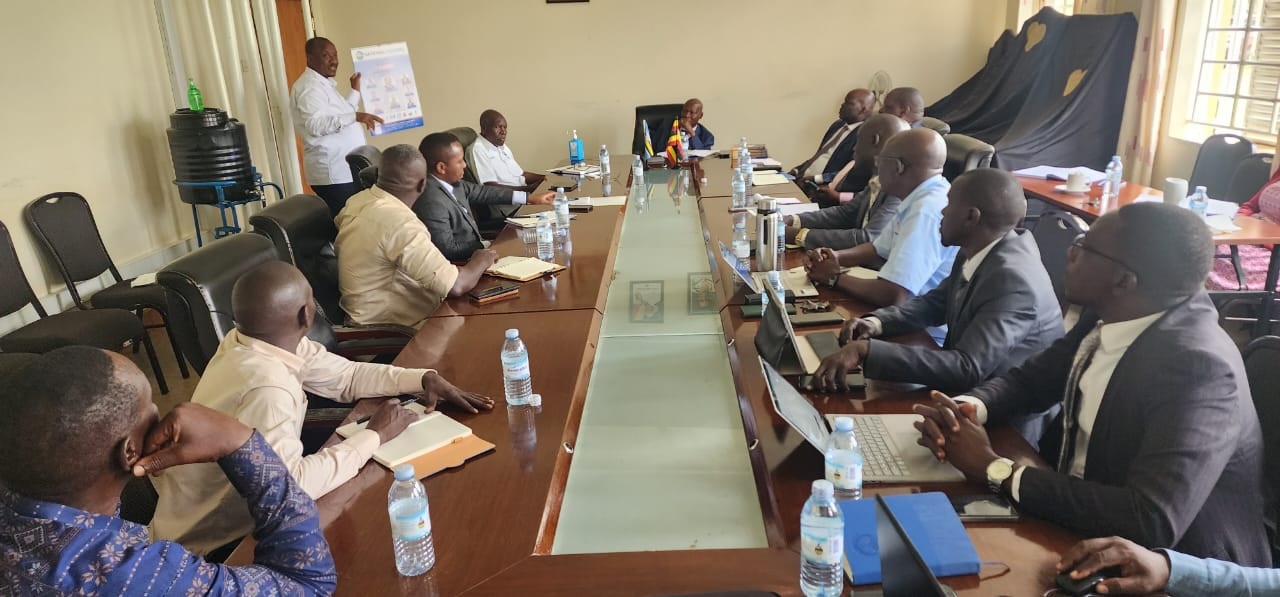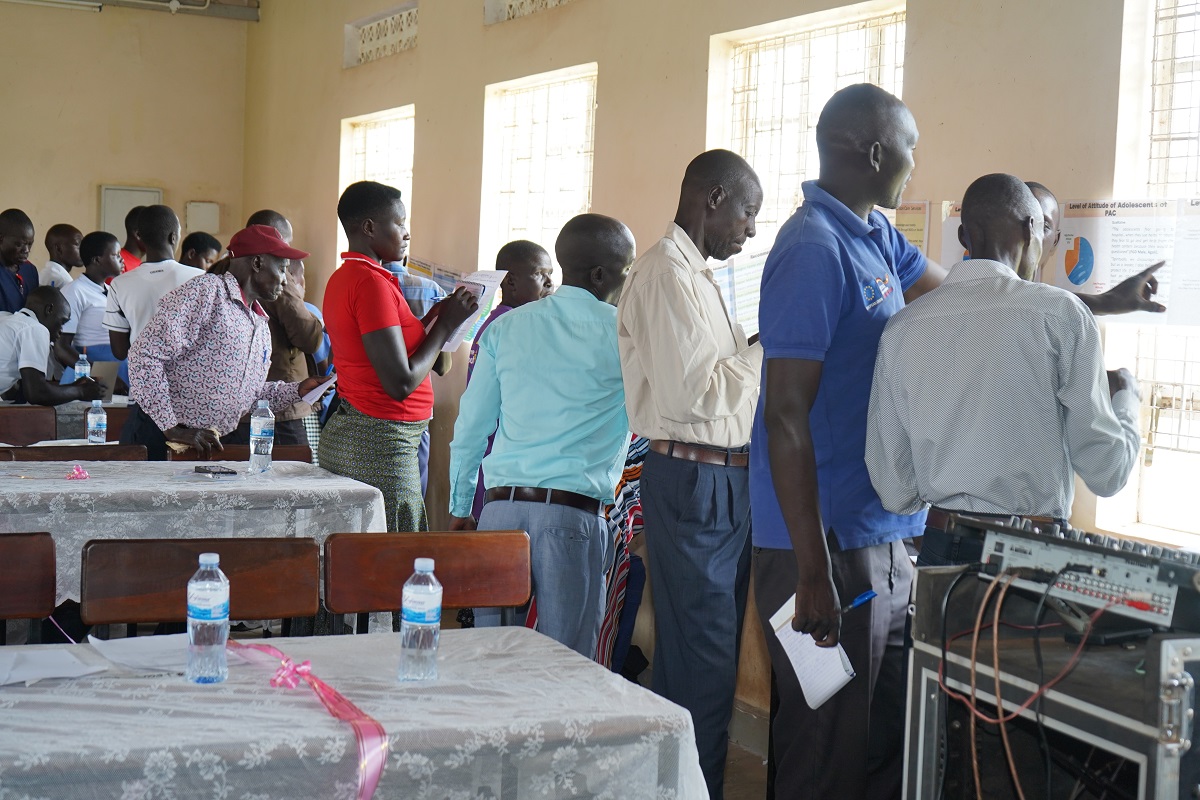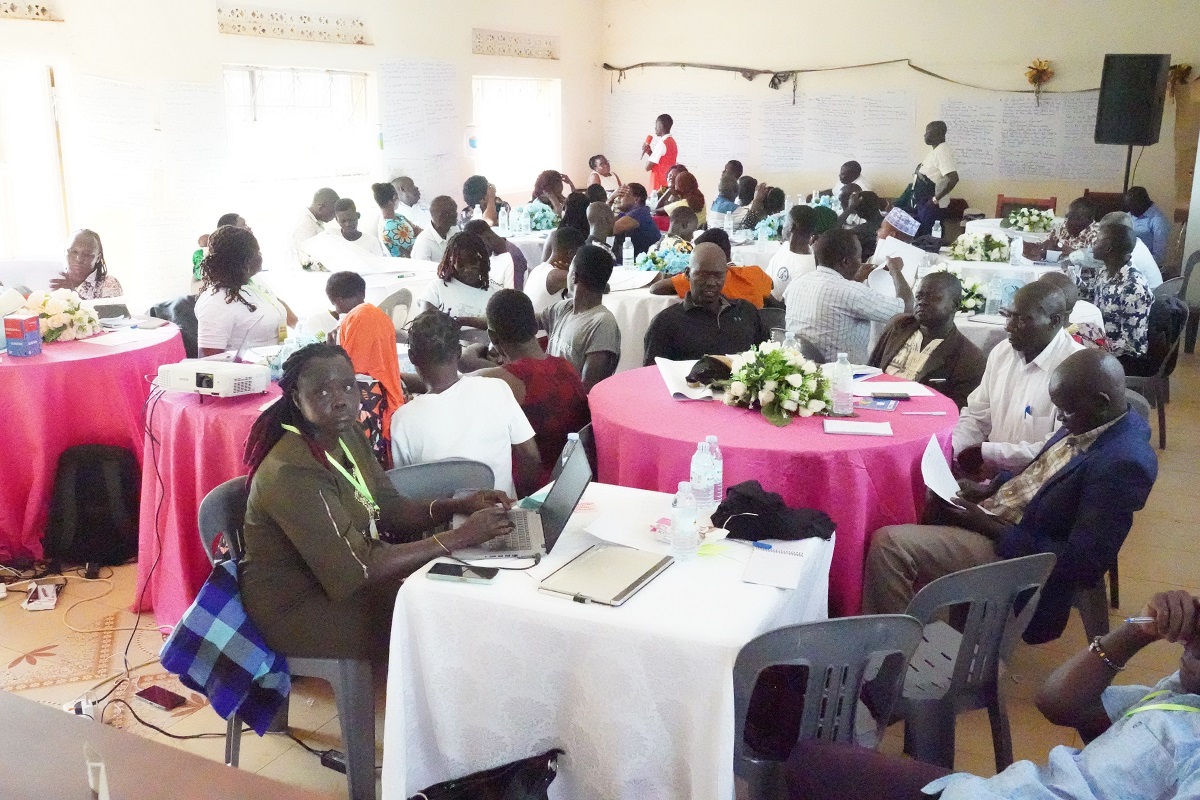By Patrick Opio
Senior Communications Officer
Lira University Council Chairperson, Mr. David Geoffrey Opiokello has commended the Management for organising the Budget Conference for 2026/2027 Financial Year saying the event benefits the institution by improving financial planning and resource allocation.
The University’s proposed Budget Framework for financial year 2026/2027 indicative planning figures and resource envelope is shs 46,149,374,370, the same amount for the approved Budget of the current financial year 2025/2026 running.
Mr. Opiokello said the Budget Conference gives opportunities for aligning departmental goals with the university’s mission, increasing transparency and accountability, and fostering collaboration among stakeholders. He was speaking at the Conference held in the Public Hall at Education Block on 24th October 2025.
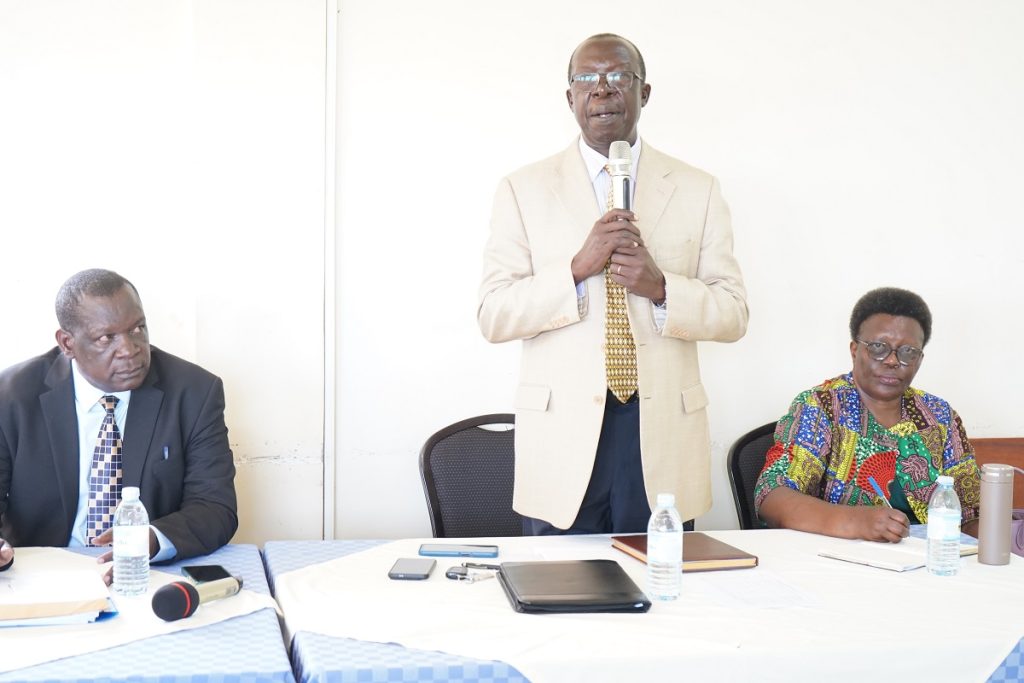
(Standing), Mr. David Geoffrey Opiokello, Chairperson Council speaking as Vice Chairperson Council, Ms. Nellie Florence Okullo(R) and CPA Nathan Hagobi(L) look on
Hasahya Nathan Hagobi (CPA), Ag. Deputy Vice Chancellor (Finance and Administration) said, “such conferences help coordinate activities, ensure efficient use of funds, and provide a framework for achieving both short-term and long-term objectives.”
This Budget Conference today, CPA Hagobi, also the University Bursar said, provides a critical platform for participatory planning and budgeting. “It allows all key stakeholders to jointly review our performance, identify funding priorities, and align our resource allocation to the University’s strategic objectives, the Education and Sports Sector priorities, and the Fourth National Development Plan (NDPIV),” he added.
“Through this forum, we ensure that our financial decisions are informed by evidence, stakeholder input, and performance results,” CPA Hagobi said.
The Ag. DVC made the presentation that provided an overview of the University’s financial performance, highlighted the key achievements and challenges of the previous and current financial years.
CPA Hagobi also presented the proposed budget framework and strategic priorities for the Financial Year 2026/2027, underscoring measures for improving financial efficiency, accountability, and sustainability in line with the University’s goals and national development agenda.
He said the approved Budget of UGX 39,281,227,420/= for FY 2024/2025, was released 100%by the Ministry of Finance, with Government of Uganda contributing the largest share of funding (UGX 34,833,344,637/=); primarily supporting wage, non-wage recurrent, and development expenditure.
Non-Tax Revenue collections were UGX. 4,797,882,483 /= against a target of UGX 7,509,560,400/=, representing 63.9% performance, with tuition fees, application fees, service charges and rental fees being the main sources.
CPA Hagobi noted that the support from development partners, especially research grant projects externally funded, was mainly directed toward infrastructure, ICT, skills laboratory, research capacity development and community outreach.
Key outputs achieved, CPA Hagobi said, were increased enrolment due to introduction of new programs in health sciences, ICT, and education, conducted successful examinations and graduation ceremonies, enhanced e-learning and digital library access.
On infrastructure development, the Ag. DVC named the key outputs realised during the year as construction of the Completion of the main administration block, installation of solar security lights and improved campus roads and drainage, procurement of Furniture for the offices on the third floor, procurement of laboratory equipment for faculties of Medicine and Education, procurement of ICT equipment and procurement of medical equipment
On service Delivery, he said, the achievements realised were strengthened research, innovation, and community outreach initiatives, enhanced staff welfare through training and performance appraisal systems, improved sanitation, security lighting, and internet connectivity across campus, community outreach and public lectures, research conferences, hospital Clinical services and medical camps.
In FY 2024/2025, he said, the University showed strong financial discipline and progress in academics and infrastructure, establishing a foundation for efficient, performance-based resource use in FY 2025/2026 and then to FY 2026/2027.
While in FY 2025/2026 running, CPA Hagobi said, Lira University has so far achieved progress in academics, staffing, infrastructure, and budgeting, while addressing challenges in infrastructure financing, staff shortages, and research funding remains critical.
He said the strategic priorities and focus areas for FY 2026/2027 include strengthening resource mobilization and revenue diversification, enhancing financial efficiency, accountability, and value for money (3Es; Economy, Efficiency and Effectiveness), completion and operationalization of ongoing capital projects (The Main Administration Block), expanding academic programmes in Science, Technology, Innovation, and Health.
Other priority areas are strengthening ICT systems for digital transformation, promoting staff capacity development and welfare, advancing research, innovation, and community outreach and integrating climate resilience and sustainability in university operations.
According to CPA Hagobi, the FY 2026/2027 strategic focus of the University is to strengthen growth, financial resilience, and innovation while delivering inclusive, high-quality education aligned with Uganda’s Vision 2040 and NDP IV.
He named the strategies for efficient Budget Preparation and Execution as adoption of Business Process Re-engineering (BPR) for administrative efficiency, strengthening budget discipline, internal controls, and audit mechanisms, promoting performance-based budgeting and results-oriented management, enhancing automation in financial reporting and procurement systems, continuous monitoring and evaluation of budget performance and building a culture of accountability and teamwork across departments.
The Bursar asserted that Lira University’s FY 2026/2027 budget strategy emphasizes reforms, accountability, and digitalization to optimize resource use, enhance service delivery, and ensure value for every shilling spent.
CPA Hagobi appealed to Government to increase the recurrent and development budget allocation, support for completion of key infrastructure (lecture theatres, laboratories, and staff accommodation).
He called for strengthening NTR mobilization through consultancy services, short courses, and partnerships, recruitment of critical staff in academic and administrative units, continuous stakeholder engagement for joint resource mobilization and commitment to transparency, efficiency, and accountability.
He revealed that Lira University is committed to fiscal discipline, growth, and quality service delivery, leveraging government support and stakeholder collaboration to advance human capital, research, and socio-economic development.
CPA Hagobi noted the FY 2026/2027 Budget Framework aligns Lira University’s goals with NDP V and sector plans, prioritizing resource mobilization, financial efficiency, capital project completion, academic expansion, research, ICT, and climate resilience to strengthen growth and excellence.
“The University appreciates stakeholder support and emphasizes collective responsibility, transparency, and prudent financial management to achieve sustainability, excellence, and global competitiveness,” he said.
He said the FY 2026/2027 Budget is not merely a financial document, it is a strategic roadmap for growth, innovation, and accountability. With unity of purpose, prudent management, and collaborative engagement.
“Lira University will continue to illuminate the path of higher education and sustainable development in Uganda and beyond,” he asserted.
Quoting Drucker’s approach of a Business Process Re-engineering model, CPA Hagobi said, it is time for the University, after ten years, to pause to assess past performance, identify lessons learnt, and chart a renewed strategic direction for future growth.
Heads of Faculties, Directorates and Departments presented achievements and challenges in the previous year, planned funded and non-funded priorities for the 2026/2027 financial year.
The University Council members and Committee chairpersons who attended the Conference were Ms Nellie Florence Okullo (Council’s Vice Chairperson), Dr. Rosie Agoi(Chairperson Audit and Risks Committee), Mr. Timothy Jokenne Okee ( Chairperson Finance Committee), Hon. Dickens Odongo (Chairperson Students Welfare and Discipline Committee), Dr. Robert Omara (Chairperson Estates Committee), Dr. Jimmy Obonyo, Mr. Moses Kaahwa(Staff Representative), Guild President and Vice Guild President.

